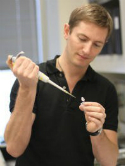Meiotic homologue alignment and its quality surveillance are controlled by mouse HORMAD1 Journal Article
| Authors: | Daniel, K.; Lange, J.; Hached, K.; Fu, J.; Anastassiadis, K.; Roig, I.; Cooke, H. J.; Stewart, A. F.; Wassmann, K.; Jasin, M.; Keeney, S.; Toth, A. |
| Article Title: | Meiotic homologue alignment and its quality surveillance are controlled by mouse HORMAD1 |
| Abstract: | Meiotic crossover formation between homologous chromosomes (homologues) entails DNA double-strand break (DSB) formation, homology search using DSB ends, and synaptonemal-complex formation coupled with DSB repair. Meiotic progression must be prevented until DSB repair and homologue alignment are completed, to avoid the formation of aneuploid gametes. Here we show that mouse HORMAD1 ensures that sufficient numbers of processed DSBs are available for successful homology search. HORMAD1 is needed for normal synaptonemal-complex formation and for the efficient recruitment of ATR checkpoint kinase activity to unsynapsed chromatin. The latter phenomenon was proposed to be important in meiotic prophase checkpoints in both sexes. Consistent with this hypothesis, HORMAD1 is essential for the elimination of synaptonemal-complex-defective oocytes. Synaptonemal-complex formation results in HORMAD1 depletion from chromosome axes. Thus, we propose that the synaptonemal complex and HORMAD1 are key components of a negative feedback loop that coordinates meiotic progression with homologue alignment: HORMAD1 promotes homologue alignment and synaptonemal-complex formation, and synaptonemal complexes downregulate HORMAD1 function, thereby permitting progression past meiotic prophase checkpoints. © 2011 Macmillan Publishers Limited. All rights reserved. |
| Keywords: | controlled study; unclassified drug; nonhuman; animal cell; mouse; oocyte; spermatocyte; synaptonemal complex; meiosis; animal tissue; complex formation; dna repair; cell protein; chromatin; double stranded dna break; down regulation; negative feedback; fertility; atr protein; chromosome segregation; prophase; horma domain protein 1 |
| Journal Title: | Nature Cell Biology |
| Volume: | 13 |
| Issue: | 5 |
| ISSN: | 1465-7392 |
| Publisher: | Nature Publishing Group |
| Date Published: | 2011-05-01 |
| Start Page: | 599 |
| End Page: | 610 |
| Language: | English |
| DOI: | 10.1038/ncb2213 |
| PROVIDER: | scopus |
| PMCID: | PMC3087846 |
| PUBMED: | 21478856 |
| DOI/URL: | |
| Notes: | --- - "Export Date: 23 June 2011" - "CODEN: NCBIF" - "Source: Scopus" |
Altmetric
Citation Impact
BMJ Impact Analytics
MSK Authors
-
 139
139Keeney -
 18
18Lange -
 17
17Roig Navarro -
 251
251Jasin
Related MSK Work



